模拟试卷七
山东省中考语文模拟试卷(七)及答案

山东省中考语文模拟试卷(七)一、积累运用(22分)1.下列加点字读音无误的一项是()A.烧酌.(zhuò)校.补(xiào)军帖.(tiě)摩肩接踵.(zhǒng)B.归省.(shěng)翩.然(piān)上溯.(sù)振聋发聩.(kuì)C.濡.养(rú)轻觑.(qù)豢.养(huàn)自渐形秽.(huì)D.睥.睨(bì)诘.难(jié)锱.铢(zī)蹑.手蹑脚(niè)2.下列词语中没有错别字的一项是()A.鄙薄挚痛振悚无虞刨根问底B.濒临题跋罅隙狼藉重峦叠幛C.静穆稀疏潦望思慕霓裳羽衣D.虚妄愕然惊骇盘桓铢两悉称3.下列句中加点词语使用不恰当的一项是()A.儿童剧《芝麻开门》的剧情抑扬顿挫....,台词诙谐幽默,受到现场观众的热烈称赞。
B.春天的卧佛寺公园,阳光明媚,草长莺飞....,我们一家人徜徉其中,尽享美景。
C.在海军建军70周年阅兵式上,人民海军挥戈闯大洋,砺剑海天间,民族自豪感在我们心中油然而生....。
D.先进文化理念是科技创新的思想源泉,科技创新推动文化产业转型升级,文化和科技是相辅相成....的。
4.下列关于文学、文化常识的表述错误的一项是()A.《战国策》是西汉刘向根据战国时期史料整理编辑的,共33篇,分国编次。
如《唐睢不辱使命》《邹忌讽齐王纳谏》,分别选自《战国策》中的《魏策》《齐策》。
B.我国古代的诗歌类型多样,有古乐府、歌行、律诗,还有词和曲。
如我们学过的《木兰诗》就属于乐府诗,辛弃疾的《南张子·登京口北固亭有怀》就是元曲。
C.儒家学说的代表人物是孔子和孟子,孔子是儒家学说的创始人,孟子是继孔子之后的儒家学派代表人物,后人尊称孔子为“圣人…至圣先师”,孟子为“亚圣”。
他们的思想体现在《论语》《孟子》里面。
D.雨果,法国作家,代表作有小说《巴黎圣母院》《悲惨世界》《九三年》等。
江西省“三校生”对口升学考试语文模拟试卷7(超清版有答案)
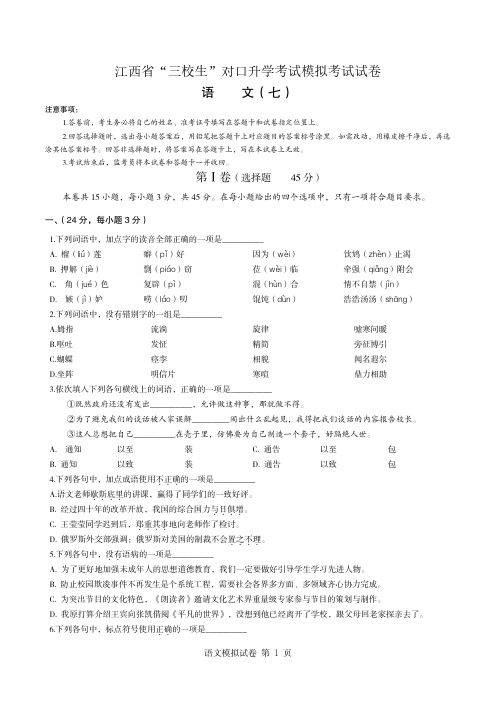
江西省“三校生”对口升学考试模拟考试试卷语文(七)注意事项:1.答卷前,考生务必将自己的姓名、准考证号填写在答题卡和试卷指定位置上。
2.回答选择题时,选出每小题答案后,用铅笔把答题卡上对应题目的答案标号涂黑。
如需改动,用橡皮擦干净后,再选涂其他答案标号。
回答非选择题时,将答案写在答题卡上,写在本试卷上无效。
3.考试结束后,监考员将本试卷和答题卡一并收回。
第Ⅰ卷(选择题45分)本卷共15小题,每小题3分,共45分。
在每小题给出的四个选项中,只有一项符合题目要求。
一、(24分,每小题3分)1.下列词语中,加点字的读音全部正确的一项是__________A. 榴(liú)莲癖(pǐ)好因为(wèi)饮鸩(zhèn)止渴B. 押解(jiè)剽(piáo)窃莅(wèi)临牵强(qiǎng)附会C.角(jué)色复辟(pì)混(hùn)合情不自禁(jìn)D.嫉(jì)妒唠(láo)叨馄饨(dùn)浩浩汤汤(shāng)2.下列词语中,没有..错别字的一组是__________A.姆指流淌旋律嘘寒问暖B.呕吐发怔精简旁征博引C.蝴蝶痉孪相貌闻名遐尔D.坐阵明信片寒喧鼎力相助3.依次填入下列各句横线上的词语,正确的一项是__________①既然政府还没有发出__________,允许做这种事,那就做不得。
②为了避免我们的谈话被人家误解_________闹出什么乱起见,我得把我们谈话的内容报告校长。
③这人总想把自己__________在壳子里,仿佛要为自己制造一个套子,好隔绝人世。
A.通知以至装 C. 通告以至包B. 通知以致装 D. 通告以致包4.下列各句中,加点成语使用不正确...的一项是__________A.语文老师歇斯底里....的讲课,赢得了同学们的一致好评。
B. 经过四十年的改革开放,我国的综合国力与日俱增....。
小学毕业语文模拟试卷(七)

小学毕业语文模拟试卷(七)_ldquo;张_rdquo;在字典里的解释有:①展开,开;②铺排陈设;③看,望;④量词;⑤姓._ldquo;张灯结彩_rdquo;的_ldquo;张_rdquo;是第( )种解释;_ldquo;东张西望_rdquo;的_ldquo;张_rdquo;是第( )种解释.2.比一比,组成词语.(3分)钓( ) 妨( ) 询( )钩( ) 防( ) 讯( )三词语.(共12分)1.将成语补充完整,再把含不好感情色彩的写在横线上.(6分)欣欣向( ) 舍( )为人 ( )气凌人口若( )河好高( )远精兵( )政神机妙( ) 高( )远瞩______________________________________________2.选词填空.(6分)严肃严厉严格夸口夸耀夸奖优异优秀优良因为_hellip;_hellip;所以_hellip;_hellip; 不但_hellip;_hellip;而且_hellip;_hellip;王宏同学处处( )要求自己,( )思想品德好,( )学习成绩好.大家都( )他是一个( )的少先队员.可是他从来不( )自己.四句子.(共12分)1.修改病句(在原句上改).(6分)①小明出席了市里的作文竞赛._______________________②他经常回忆过去有趣的往事._______________________③我们从小就要养成讲卫生懂礼貌.____________________________2.按要求换一种说法.(6分)①澎湃的波涛把海里的泥沙卷到岸边.(换成_ldquo;被_rdquo;字句)___________________________________________②人与山的关系日益密切,怎能不使我们感到亲切舒服呢?(换成陈述句)____________________________________________③爸爸辅导我.我学作文.(把两句话合成一句话)____________________________________________五应用文.(4分)李华同学患重感冒,医生要他休息两天.请以李华的身份向张老师写一张请假条,日期是5月10日.六课内阅读.(共18分)1.判断下面的说法,对的在括号里画_ldquo;_radic;_rdquo;错的画_ldquo;_times;_rdquo;. (4分)①《林海》一课中讲的_ldquo;大兴安岭美得并不空洞_rdquo;,主要是因为大兴安岭有岭林花.( )②《伏尔加河上的纤夫》这幅画是俄国画家列宾的作品.( )④《书的故事》和《在仙台》都是写鲁迅先生关心爱护青年的故事.( )2.按《三衢道中》原诗填空,并按要求答题.(6分)梅子黄时日日( ),小溪( )尽却山行.绿( )不减来时路,( )得黄鹂四五声.这首诗是写三衢道( )时候的景色.诗中的一对反义词是( )和( ).全诗写了诗人山行时( )的心情.3.阅读课文片断,回答问题.(8分)詹天佑亲自带着学生和工人,背着标杆经纬仪在峭壁上定点构图.塞外常常是狂风怒号,黄沙满天,一不小心就有坠入深谷的危险.詹天佑不管条件怎样恶劣,始终坚持在野外工作._hellip;_hellip;遇到困难,他总是想:这是中国人自己修筑的第一条铁路,一定要把它修好.否则,不但那些外国人要讥笑我们,而且会使中国工程师失掉信心.①用_ldquo;_radic;_rdquo;画出带点字的正确读音.(2分)②从这段话中可以看出詹天佑在勘测线路时遇到( )险峻和( )恶劣这两方面的困难.(2分)③在原文中用_ldquo;_____rdquo;线画出詹天佑遇到困难时的想法.(2分)他的想法说明了什么?(2分)____________________________________________七课外阅读(共12分)三个和尚1 一个活泼伶俐的小和尚来到山上的一座庙宇,他勤快地挑水,不但自己够喝,还往菩萨手中的净瓶灌水,瓶里的柳枝活了.不久,来了一个瘦和尚,他与小和尚为了喝水和挑水发生争执,谁也不愿意吃亏.后来又来了一位胖和尚,三个和尚都要喝水,但谁都不愿意挑水,没过两天,水缸露底了,净瓶中的柳枝也因没有水而开始枯萎了.2 一天夜里,三个和尚都在打盹的时候,一支正在燃烧的蜡烛被一只老鼠几口咬断了.半截蜡烛掉在香案上,庙宇起火了.危急之中,三个和尚一齐争先恐后挑水救火.一场大火很快被扑灭了.3 大火过后,三个和尚都明白了一个道理.从此水缸里的水又满了.三个和尚高兴地捧着大碗喝水.菩萨手中净瓶里的柳枝又亭亭而立了.1.用_ldquo;‖_rdquo;线给第一自然段分层(3分),并写出每层的主要意思.(3分)______________________________________________________________ __________________________________________________________________ ____________________________________2.联系上下文,解释下面词语的意思.(3分)争先恐后_mdash;_mdash;大火过后,三个和尚明白了一个道理.这个道理是:(在正确的答案后打_radic;)(3分)①大家都不打盹,就不会发生火灾.( )②人多了,就不好办事.( )③只要大家同心协力,共同劳动,就能办好事情.( )八作文.(30分)题目:一个________________________的人提示:①先将题目补充完整(如:受尊敬勤奋好学助人为乐诚实风趣_hellip;_hellip;)②要通过具体事例表现人物的性格特点或思想品质,注意写出真情实感.小学毕业语文模拟试卷(七)答案一 (思索) (问候) (计较)(热望) (委托) (感染)二 1.(Z) (弓) (4) (7)② ③2.(钓鱼) (妨碍) (询问)(鱼钩) (防卫) (审讯)三 1.(荣) (己) (盛) (悬)(骛) (简) (算) (瞻)好高骛远盛气凌人2.(严格) (不但) (而且)(夸奖) (优秀) (夸耀)四 1.①用_ldquo;参加_rdquo;换掉_ldquo;出席_rdquo;② 过去或往(只取一个)③句尾加_ldquo;的习惯_rdquo;.2.①海里的泥沙被澎湃的波涛卷到岸边.②人与山的关系日益密切,不能不使我们感到亲切舒服. (或真使我们感到_hellip;_hellip;)③爸爸辅导我学作文.五应用文张老师:我因患重感冒,不能到校上课,请假两天.您的学生李华5月10日六 1.①(_times;) ②(_radic;) ③(_times;) ④(_times;) 2.(晴) (泛)(阴) (添)(初夏) (晴) (阴)(新鲜喜悦)3.①s4i(_radic;) h2o(_radic;)②(地势) (气候)答:他的想法说明了他具有爱国主义精神.(或他热爱祖国.) 七课外阅读1..‖不久, .‖后来①小和尚挑水喝,还往净瓶里灌水,使净瓶里的柳枝活了.②瘦和尚和小和尚谁也不愿挑水.③三个和尚都不愿挑水,柳枝也枯萎了.2.庙宇起火的危急之中,三个和尚一齐争着向前唯恐落后挑水救火. 3.③(_radic;)八略。
淮安市中考英语模拟试题7
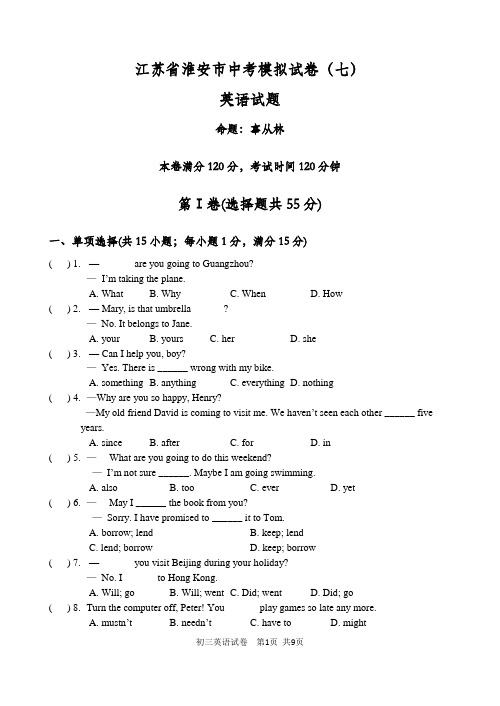
江苏省淮安市中考模拟试卷(七)英语试题命题:辜从林本卷满分120分,考试时间120分钟第Ⅰ卷(选择题共55分)一、单项选择(共15小题;每小题1分,满分15分)( ) 1. — ______ are you going to Guangzhou?—I’m taking the plane.A. WhatB. WhyC. WhenD. How( ) 2. — Mary, is that umbrella ______?—No. It belongs to Jane.A. yourB. yoursC. herD. she( ) 3. — Can I help you, boy?—Yes. There is ______ wrong with my bike.A. somethingB. anythingC. everythingD. nothing( ) 4. —Why are you so happy, Henry?—My old friend David is coming to visit me. We haven’t seen each other ______ five years.A. sinceB. afterC. forD. in( ) 5. —What are you going to do this weekend?—I’m not sure ______. Maybe I am going swimming.A. alsoB. tooC. everD. yet( ) 6. —May I ______ the book from you?—Sorry. I have promised to ______ it to Tom.A. borrow; lendB. keep; lendC. lend; borrowD. keep; borrow( ) 7. — ______ you visit Beijing during your holiday?—No. I ______ to Hong Kong.A. Will; goB. Will; wentC. Did; wentD. Did; go( ) 8. Turn the computer off, Peter! You ______ play games so late any more.A. mustn’tB. needn’tC. have toD. might( ) 9. It began to rain ______ I was walking in the park.A. untilB. becauseC. whileD. although( ) 10. — What’s wrong with you, sir?— My flight ______ ten minutes ago. What should I do?A. took upB. took offC. got onD. got off( ) 11. — What nice coffee!—But I think it will taste ______ with sugar.A. wellB. badC. worseD. better( ) 12. Teachers will hardly use chalk in the future, ______?A. will heB. won’t heC. will theyD. won’t they( ) 13. — Everyone should help save the planet.—Yeah. I’ve stopped ______ plastic bags when shopping.A. to useB. usingC. useD. used( ) 14. — Can you sing this song in English?—Of course I can. It ______ often ______ by us kids.A. is; singingB. does; singC. has; sungD. is; sung( )15. —I hear Miss Wang will go boating with us this Sunday.— ______ We will have a good time.A. Good news!B. Thanks a lot.C. What a pity!D. Don’t mention it.二、完形填空(共15小题,每小题1分,满分15分)阅读下文,掌握其大意,然后从各题所给的四个选项中选出一个最佳答案。
大学英语四级模拟试卷之七
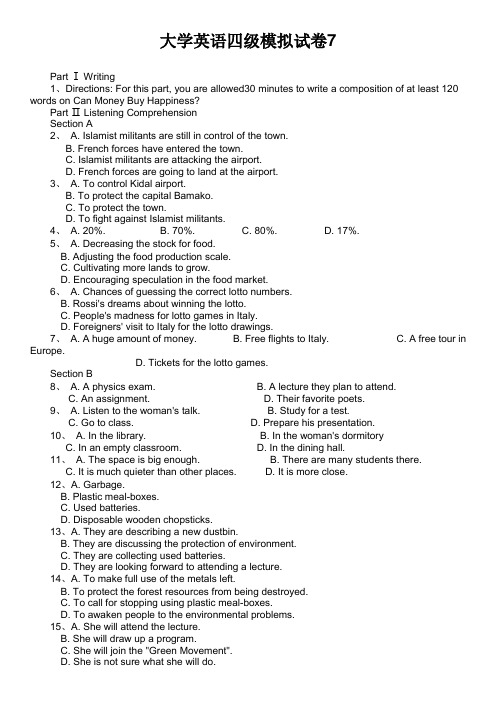
大学英语四级模拟试卷7Part Ⅰ Writing1、Directions: For this part, you are allowed30 minutes to write a composition of at least 120 words on Can Money Buy Happiness?Part Ⅱ Listening ComprehensionSection A2、A. Islamist militants are still in control of the town.B. French forces have entered the town.C. Islamist militants are attacking the airport.D. French forces are going to land at the airport.3、A. To control Kidal airport.B. To protect the capital Bamako.C. To protect the town.D. To fight against Islamist militants.4、A. 20%. B. 70%. C. 80%. D. 17%.5、A. Decreasing the stock for food.B. Adjusting the food production scale.C. Cultivating more lands to grow.D. Encouraging speculation in the food market.6、A. Chances of guessing the correct lotto numbers.B. Rossi's dreams about winning the lotto.C. People's madness for lotto games in Italy.D. Foreigners' visit to Italy for the lotto drawings.7、A. A huge amount of money. B. Free flights to Italy. C. A free tour in Europe.D. Tickets for the lotto games.Section B8、A. A physics exam. B. A lecture they plan to attend.C. An assignment.D. Their favorite poets.9、A. Listen to the woman's talk. B. Study for a test.C. Go to class.D. Prepare his presentation.10、A. In the library. B. In the woman's dormitoryC. In an empty classroom.D. In the dining hall.11、A. The space is big enough. B. There are many students there.C. It is much quieter than other places.D. It is more close.12、A. Garbage.B. Plastic meal-boxes.C. Used batteries.D. Disposable wooden chopsticks.13、A. They are describing a new dustbin.B. They are discussing the protection of environment.C. They are collecting used batteries.D. They are looking forward to attending a lecture.14、A. To make full use of the metals left.B. To protect the forest resources from being destroyed.C. To call for stopping using plastic meal-boxes.D. To awaken people to the environmental problems.15、A. She will attend the lecture.B. She will draw up a program.C. She will join the "Green Movement".D. She is not sure what she will do.Section C16、A. Summer vacation.B. The housing office.C. Resident advisers.D. Check-out procedures.17、A. Register for summer school.B. Repair holes in room walls.C. Remove personal property.D. Call the housing office.18、A. Their summer addresses.B. Any damage to their rooms.C. When they plan to leave.D. Questions for the housing office.19、A. The head of the Alumni Office.B. A doctor.C. A professor of business administration.D. A student from last year's program.20、A. Medical interns.B. Undergraduate students.C. Local business executives.D. Alumni sponsors.21、A. They give money to sponsor the program.B. They write letters of recommendation.C. They provide job opportunities.D. They work for the Alumni Office.22、A. Pot using. B. Wet cloth. C. Sand. D. Temperature.23、A. People who eat spoiled food may get sick.B. Farmers have to throw away spoiled products.C. Farmers have to sell the spoiled products quickly at a low price.D. People need money to dispose of the spoiled food.24、A. By electricity.B. Through an evaporation process.C. Through a freezing process.D. With the help of some special bacteria.25、A. He sold his invention to make money.B. He preferred invention to teaching.C. He was honored with an award for his teaching methods.D. He financed 5000 pot-in-pot systems to help people.Part Ⅲ Reading ComprehensionSection ADirections: In this section, there is a passage with ten blanks. You are required to select one word for each blank from a list of choices given in a word bank following the passage. Read the passage through carefully before making your choices. Each choice in the bank is identified by a letter. Please mark the corresponding letter for each item on Answer Sheet 2 with a single line through the centre. You may not use any of the words in the bank more than once.One in six. Believe it or not, that's the number of Americans who struggle with hunger. To make tomorrow a little better, Feeding America, the nation's largest 26 hunger-relief organization has chosen September as Hunger Action Month. As part of its 30 Ways in 30 Days program, it's asking 27 across the country to help the more than 200 food banks and 61,000 agencies in its network provide low-income individuals and families with the fuel they needto 28 .It's the kind of work that's done every day at St. Andrew's Episcopal Church in San Antonio. People who 29 at its front door on the first and third Thursdays of each month aren't looking for God—they're there for something to eat, St. Andrew's runs a food pantry (食品堂) that 30 thecity and several of the 31 towns. Janet Drane is its manager.In the wake of the 32 , the number of families in need of food assistance began to grow. It is 33 that 49 million Americans are unsure of where they will find their next meal. What's most surprising is that 36% of them live in 34 where at least one adult is working. "It used to be that one job was all you needed," says St. Andrew's Drane. "The people we see now have three or four part-time jobs and they're still right on the edge 35 ."A. surviveB. surroundingC. servesD. reviewedE. reportedF. recessionG. householdsH. gatherI. formally J. financially K. domestic L. competitionM. communities N. circling O. accumulateSection BDirections: In this section, you are going to read a passage with ten statements attached to it. Each statement contains information given in one of the paragraphs. Identify the paragraph from which the information is derived. You may choose a paragraph more than once. Each paragraph is marked with a letter. Answer the questions by marking the corresponding letter on Answer Sheet 2.Want to Learn Quicker? Use Your BodyA. Ever dealt with a problem? Picked up a new skill? Grasped a difficult concept? The language of learning is full of references to parts of the body outside the brain. Researchers discover that learning is easier, quicker and more long-lasting if lessons involve the body as well as the mind—whether it's gesturing with the arms or moving around a room. Can these insights enhance teaching and learning in the future? And should it inform the way technology is employed in the classroom?B. "In the past, people have argued that as we learn we become more able to think abstractly," says Andrew Manches, a psychologist at the University of Edinburgh in the UK. Conventional thinking might suggest that teachers should help children get rid of physical objects and body gestures to prepare them for the adult world. But in truth, the physical world never really leaves our thinking. For example, when we process verbs such as lick, kick and pick, medical scanners show that the parts of our brain that control the muscles in our face, legs and hands, respectively, light up with activity. And even the most abstract of concepts may have grounding in the real world.C. Body and mind—This theory is called embodied cognition(体验认知), and it suggests that what goes on in our minds stems from our actions and interactions with the world around us. It means that encouraging children to think and learn in a purely abstract way might actually make lessons harder for them to understand and remember. Science is beginning to back up the idea that actions really might speak louder than words in the classroom.D. Spencer Kelly, a psychologist at Colgate University in Hamilton, New York, has found that people spend three times as much time gesturing when they think it is particularly important that they get a message across, suggesting that even at the subconscious level, we appreciate the communicative value of our body language. Studies show that young children learn more if their teacher uses gestures when explaining a concept.E. Meanwhile, Susan Wagner Cook, a psychologist at the University of Iowa in Iowa City, has found that children pick up new concepts more effectively if they are taught to mirror and repeat the gestures their teacher uses, and that lessons involving words and gestures live longer in a student's memory than lessons using words alone.F. There's a place for technology—particularly with the rise of gesture-recognition devices like the Nintendo Wii (任天堂游戏机), Microsoft's Kinect add-on (外设设备) for the Xbox and touchscreen tablet PCs. Researchers at the University of California, Berkeley, turned two Wii-mote video game controllers into a device that helps children visualize equivalence ratios (等值比)—for instance, understanding how if one plant grows twice as fast as another, the difference between their respective heights will become larger over time. This can be a tricky concept for children to understand. When asked to use their hands to represent the different growth rates, some students will place one hand slightly higher than the other, but then raise both hands at the same speed. The Berkeley team's device gives the children instant feedback, helping them work out when their hand gestures correctly match what would happen as the two plants grow. Afterwards, almost allstudents say that they actually understand why moving their hands at different speeds is the correct response.G. The Kinect sensor, meanwhile, is being used in studies to help children learn to more accurately map numbers onto physical space—a simple skill but one that is fundamental to our understanding of mathematics. Most people know, for instance, to place the number 50 exactly midway along a line marked "0" at one end and "100" at the other. Researchers at Eberhard Karls University in Tuebingen, Germany, found that seven-year-olds can place numbers along such a line more accurately if they physically walk the line on the floor—with their motion captured and analysed by the Kinect sensor-than if they use a mouse to interact with a computer screen representation of the line. Manches has begun exploring whether Kinect offers a way to re-imagine traditional children's blocks(积木). The technology allows children to pick up and manipulate virtual blocks on the screen using the same gestures they would use to play with real blocks—but the virtual blocks can do new things like change colour as they are pulled apart into smaller units, giving children fresh ideas about the way numbers can be broken down.H. In light of all this, it's tempting to conclude that teachers, and their students, should be jumping up and down, or waving their arms about during lessons. Manches, however, advises caution. The trouble is, science has not quite worked out exactly how the relationship between body and mind effects work. "You can't jump into the prediction and intervention stage too early," says Manches.I. This isn't to say there aren't working theories for what's going on, particularly when it comes to understanding why gesturing helps store information more firmly in the mind, says Cook. The lessons we learn at school usually involve declarative memory(陈述性记忆)—these are the facts that we can consciously recall or "declare" at a later date. But some of our memories arenon-declarative—things we can remember without really being able to explain why.J. The classic example is how we never really forget how to ride a bike. Physical movements seem to be particularly suitable fodder(素材) for making non-declarative memories, and so by both speaking and gesturing, we may encourage our brains to make two independent memories of an event, boosting our chances of remembering the event later.K. Even though researchers like Manches and Cook remain reluctant to set out prescriptive guidelines for teachers, their caution is beginning to weaken. "Five years ago I might have said there's potential for real harm in giving teachers instructions from this research," says Cook. Today, she is less worried of the potential to do damage—in part because none of her studies to-date has uncovered any evidence of side effects.36、Based on the theory of embodied cognition, science is starting to pay more attention to the importance of actions in the classroom.37、Researchers find that the involvement of both the mind and the body can make learning easier and quicker.38、The knowledge we get from school often has to do with declarative memories.39、Contrary to conventional thinking, the physical world is closely linked with our thinking.40、Our brain can make two independent memories of an event through language and action.41、Young students can learn more if their teacher uses gestures when explaining a concept.42、Seven-year-olds can put numbers along a certain line more accurately if they actually walk the line.43、Up to now, Cook's studies have not shown any evidence of side effects.44、Manches warns that we should enter prediction and intervention stage when it is the right time.45、A student can remember for a longer time lessons using words and gestures than lessons involving words alone.Section CDirections: There are 2 passages in this section. Each passage is followed by some questions or unfinished statements. For each of them there are four choices marked A, B, C and D. You should decide on the best choice and mark the corresponding letter on Answer Sheet 2 with a single line through the centre.Passage OneSalt is a principal wicked substance. Salt, sodium chloride(氯化钠), 40 percent of which is sodium(钠), is an element essential to human body. But sodium also boosts blood pressure. It makes the body retain fluids; greater fluid retention increases total blood volume, and this increase raises blood pressure. Where salt is used freely, a large proportion of the population develops chronic high blood pressure, which is a primary factor in heart disease and stroke. Farmers in northern Japan traditionally preserve their food with salt. They consume as much as six teaspoons a day—and 40 percent of them have high blood pressure. Among the Eskimos of Greenland, however, who consume little salt, high blood pressure is almost unheard of.The body of an adult needs only about 200 milligrams of sodium a day—the amount in 500 milligrams, or 1/10 of teaspoon, of salt. But the average American consumes about 12,000 milligrams, or more than two teaspoons, of salt a day—which supplies 24times as much sodium as necessary; Germans consume an average 5,300 milligrams of salt a day. A sharp reduction is recommended by authorities everywhere—to about 8,000milligrams of salt per day for healthy people. For those who already suffer from high blood pressure, the normally suggested maximum is about 2,000 milligrams per day;more drastic restrictions—to about 200 milligrams—are required in special cases.However, if this recommendation is adopted, food will become almost insufferably bland for most Americans and Europeans. So some physicians prescribe as a replacement seasoning potassium chloride (氯化钾), which tastes salty but contains no sodium. Meanwhile, it should also be taken into account that extremely heavy use of potassium unlikely because of its unpleasant taste in large doses—can cause death. Hence, the substitution of one chloride for the other should be undertaken only on the advice of a doctor.46、Which of the following is the main topic of the passage? ______A. The difference between sodium chloride and potassium chloride.B. The function of slat in daily life.C. A comparative study of slat consumption habits in some countries.D. The relationship between salt consumption and high blood pressure.47、According to the passage, which of the following is NOT true about the function and nature of slat? ______A. It is composed of sodium and chloride.B. It helps the body to keep fluid substance.C. Too much salt consumed can lead to high blood pressure.D. It is the direct cause of heart diseases.48、According to the passage, how much sodium do farmers in northern Japan consume each day? ______A. 8000 milligrams.B. 30000 milligrams.C. 12000 milligrams.D. 5000 milligrams.49、What does the underlined word "bland" in the last paragraph is closest in meaning to which of the following words? ______A. saltyB. tastelessC. deliciousD. dull50、What is the major reason why some doctors give patients potassium chloride? ______A. It is used as medicine.B. It contains no sodium.C. It makes food tasty.D. Human body can easily absorb potassium chloride.Passage TwoWhat are feelings for? Most non-scientists will find it a strange question. Feelings .justify themselves. They need serve no other purpose in order to exist. On the other hand, many evolutionary biologists, in contrast to animal behaviorists, acknowledge some emotions areprimarily for their survival function. For both animals and humans, fear motivates the avoidance of danger, love is necessary to care for young, and anger prepares one to hold ground. But the fact that a behavior functions to serve survival need not mean that; that is why it is done. Other scientists have attributed the same behavior to conditioning, to learned responses. Certain reflexes and fixed action patterns can occur without feelings or conscious thought. A gull chick pecks at a red spot above it. The parent has a red spot on its bill (喙); the chick pecks the parent's bill. The gull parent feeds its chick when pecked on the bill. The baby gets fed. The interaction need have no emotional content.At the same time, there is no reason why such actions cannot have emotional content. In mammals—including humans—that have given birth, milk is often released automatically when a new baby cries. This is not under voluntary control; it is reflex. Yet this does not mean that feeding a new baby is exclusively reflex and expresses no feeling like love. Humans have feelings about their behavior even if it is conditioned or reflexive. Yet since reflexes exist, and conditioned behavior is widespread, measurable, and observable, most scientists try to explain animal behavior using only these concepts. It is simpler.Preferring to explain behavior in ways that fit scientific methods most easily, scientists have refused to consider any causes for animal behavior other than reflexive and conditioned ones. Scientific orthodoxy (_正统观念) holds that what cannot be readily measured or tested cannot exist, or is unworthy of serious attention. But emotional explanations for animal behavior need not be impossibly complex or unstable. They are just more difficult for the scientific method to verify in the usual ways, cleverer and more sophisticated approaches are called for. Most branches of science are more willing to make successive approximations (近似值) to what may prove ultimately unknowable, rather than ignoring it altogether.51、What do many evolutionary biologists believe?A. Some emotions do not exist.B. Emotions are helpful for people's survival.C. Emotions give meaning and depth to life.D. Only humans have emotions.52、What can we learn from the example of a gull chick pecking the parent's bill?A. Behaviors can be learned and have no emotional content.B. It is the innate characteristic for adults to look after the young.C. It takes time for animals to be conditioned.D. Emotions are very important to survival.53、Why does the author think most scientists explain animal behavior in terms of reflexes and conditioning?A. They are the most essential factors for animals to surviveB. They are important for animals to develop learned and emotional behaviorsC. They are convenient for scientists to explain animals' behaviorD. They will lead to a better understanding of animal emotions54、What should scientists do to study animal emotions?A. They should set up improved and refined skillful experiments.B. They should analyze human emotions.C. They should distinguish what is emotional and what is conditioned.D. They should learn from animal behaviorists.55、What is the author's main purpose of writing this passage?A. To make the point that emotions are worth our attention.B. To explain what reflexive behavior is.C. To compare human emotions with animal emotions.D. To discuss the importance of emotions.Part Ⅳ TranslationDirections: For this part, you are allowed 30 minutes to translate a passage from Chinese into English. You should write your answer on Answer Sheet 2.56、泰山位于山东省西部。
普通话水平测试模拟试卷(七)

普通话水平测试模拟试卷(七)一、读单音节字词准骗娘广日波选鬓霜耳峰盆厢褶恰胎臣拐粤嘴荡慌算砷永如捺魂款绪碟粪棱均特栽抵膜钩防洛雨圣偷暮晚字争筹刮范夕井涉评北型四绒氨怀袄云伙坝纠犁缺伍襟掉趴草瞥括粗填蹿穷黑潮伞浓巧王买流娶鼻吃廊踩葬唇甲坠栋烤抓院二、读多音节词语英雄群体候鸟协商首饰柔软刺激跑腿儿夸张状况而且下降男女镇压坎肩儿全面扫帚工作画外音差别虐待衰老训练聪明课本红包儿谬论回归富翁所有制强度断层表皮盖子长城顶点合同掠夺挨个儿佛法赞美消费速率恩情窘迫问卷人民不以为然三、朗读短文在里约热内卢的一个贫民窟里,有一个男孩子,他非常喜欢足球,可是又买不起,于是就踢塑料盒,踢汽水瓶,踢从垃圾箱里拣来的椰子壳。
他在胡同里踢,在能找到的任何一片空地上踢。
有一天,当他在一处干涸的水塘里猛踢一个猪膀胱时,被一位足球教练看见了。
他发现这个男孩儿踢得很像是那么回事,就主动提出要送给他一个足球。
小男孩儿得到足球后踢得更卖劲了。
不久,他就能准确地把球踢进远处随意摆放的一个水桶里。
圣诞节到了,孩子的妈妈说:“我们没有钱买圣诞礼物送给我们的恩人,就让我们为他祈祷吧。
”小男孩儿跟随妈妈祈祷完毕,向妈妈要了一把铲子便跑了出去。
他来到一座别墅前的花园里,开始挖坑。
就在他快要挖好坑的时候,从别墅里走出一个人来,问小孩儿在干什么,孩子抬起满是汗珠的脸蛋儿,说:“教练,圣诞节到了,我没有礼物送给您,我愿给您的圣诞树挖一个树坑。
”教练把小男孩儿从树坑里拉上来,说,我今天得到了世界上最好的礼物。
明天你就到我的训练场去吧。
三年后,这位十七岁的男孩儿在第六届足球锦标赛上独进二十一球,为巴西第一次捧回了金杯。
一个原∥来不为世人所知的名字——贝利,……四、命题说话1.我喜爱的文学(或其他)艺术形式2.我的朋友。
人教版2020年小升初数学模拟试卷(7) 参考答案与试卷解析
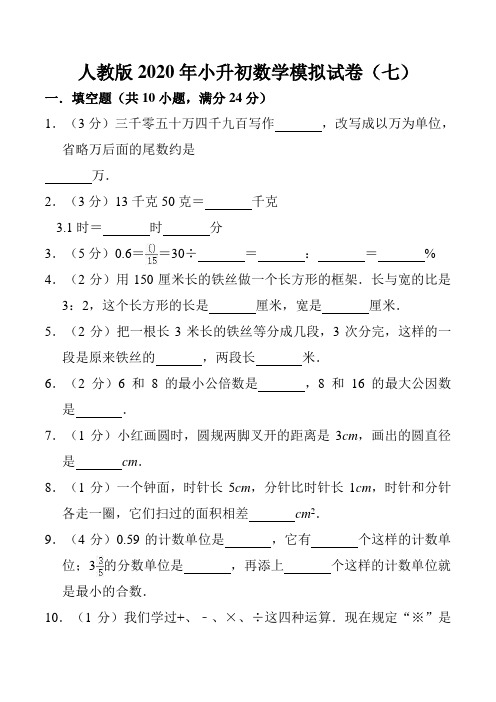
人教版2020年小升初数学模拟试卷(七)一.填空题(共10小题,满分24分)1.(3分)三千零五十万四千九百写作,改写成以万为单位,省略万后面的尾数约是万.2.(3分)13千克50克=千克3.1时=时分3.(5分)0.6==30÷=:=% 4.(2分)用150厘米长的铁丝做一个长方形的框架.长与宽的比是3:2,这个长方形的长是厘米,宽是厘米.5.(2分)把一根长3米长的铁丝等分成几段,3次分完,这样的一段是原来铁丝的,两段长米.6.(2分)6和8的最小公倍数是,8和16的最大公因数是.7.(1分)小红画圆时,圆规两脚叉开的距离是3cm,画出的圆直径是cm.8.(1分)一个钟面,时针长5cm,分针比时针长1cm,时针和分针各走一圈,它们扫过的面积相差cm2.9.(4分)0.59的计数单位是,它有个这样的计数单位;3的分数单位是,再添上个这样的计数单位就是最小的合数.10.(1分)我们学过+、﹣、×、÷这四种运算.现在规定“※”是一种新的运算,A※B表示2A+B,如4※3=4×2+3=11,那么4※5※6=.二.判断题(共5小题,满分5分,每小题1分)11.(1分)一个数的倍数一定大于这个数的因数.(判断对错)12.(1分)a和b是非0自然数,如果a=7b,那么a和b的最小公倍数是a.(判断对错)13.(1分)圆的半径扩大到原来的2倍,周长和面积也扩大到原来的2倍(判断对错)14.(1分)如果两个梯形的高相等,它们就一定可以拼成一个平行四边形..(判断对错)15.(1分)把一根底面半径2分米的圆柱截成2段,表面积增加平方分米,这个圆柱的底面周长是分米.三.选择题(共5小题,满分5分,每小题1分)16.(1分)算式72÷8×7可以改写成()A.72÷B.72×C.72×D.72﹣17.(1分)下面的数据,()适合用折线统计图表示.A.本年级各班人数B.一年内气温的变化情况C.女生人数占全校人数的百分之几18.(1分)一根绳子剪成两段,第一段是全长的,第二段是m,哪段长?()A.一样长B.第一段长C.第二段长D.无法确定19.(1分)张师傅生产一个零件用小时,李师傅生产一个相同的零件用小时,张师傅与李师傅的工作效率的比为()A.B.C.2:3 D.3:220.(1分)把一个长为2毫米的零件画在图纸上,在图纸上量得这个零件长2分米,求这幅图纸的比例尺是()A.1:100 B.1:1 C.100:1 D.100四.计算题(共3小题,满分30分,每小题10分)21.(10分)直接写得数2.4÷0.6=77﹣0.7=0.25×0.8=0÷2.6=30÷20%=16×25%=﹣=3﹣﹣=×3= 2.9+1=22.(12分)计算下面各题,能简算的要简算.7.28﹣(1.25+0.28)0.25×38+62÷4()÷[0.75×()]23.(8分)解方程.6(x+3.5)=21.63x﹣54=21.6x﹣0.36x=1.6五.操作题(共3小题,满分16分)24.(4分)德凯小学开展体育活动,小明对五(1)班同学的锻炼情况做了统计,并绘制了下面两幅统计图.(1)五(1)班参加体育锻炼的有人,参加的人数最多.(2)根据条件把条形统计图补充完整.25.(6分)根据要求画图(1)以L为对称轴,画出图形A的另一半,使它成为轴对称图形.(2)图形B是图形D先向右平移3格,然后以O点为中心逆时针旋转90°得到的,请画出图形D.26.(6分)你知道吗?玲玲从家向北偏东30°方向行走400米到达车站,又向东偏南45°方向行走300米到达邮局,最后向东偏北60°方向行走500米到达学校.(1)根据上面的描述,把玲玲上学的路线补充完整.(2)根据路线图,说一说玲玲放学回家时要怎么走?六.填空题(共2小题,满分4分,每小题2分)27.(2分)一台收割机小时收割小麦公顷,这台收割机平均每小时收割小麦公顷,收割1公顷小麦需要小时.28.(2分)有一堆沙子,第一次拉走全部的,第二次拉走全部的30%,第一次比第二次多拉走36吨,第一次拉走多少吨?七.应用题(共6小题,满分26分)29.(4分)甲、乙两人打一份稿件,甲单独要3小时打完,乙单独要2小时打完.如果甲、乙两人合作打这份稿件,需要多少小时打完?30.(4分)榨油厂用300千克花生可以榨出39千克花生油,照这样计算,要榨出104千克油需要多少千克的花生?(用比例知识解)31.(4分)在圆柱体的体积推导过程中,把一个圆柱体平均分成若干等份,然后拼成一个近似的长方体(材料无损耗),拼成的长方体的长是6.28厘米,高是5厘米,这个圆柱体的体积是多少立方厘米?32.(4分)甲、乙两个工程队分别从两端修一条公路.甲队每天修53米,乙队每天修47米,16天修完.这条公路长多少米?33.(4分)有甲、乙两箱苹果,如果从甲箱取出10千克放入乙箱,则两箱相等:若从两箱各取出10千克,这时甲箱余下的比乙箱余下的多5千克,甲、乙两箱各有苹果多少千克?34.(6分)如图是用6个同样的牙膏盒拼成的图形,每个牙膏盒长22cm,宽和高都是4.5cm.(1)这些牙膏盒的体积是多少立方厘米?(2)这个图形的表面积是多少平方厘米?参考答案与试题解析一.填空题(共10小题,满分24分)1.解:三千零五十万四千九百写作:30504900;30504900≈3050万;故答案为:30504900,3050.2.解:(1)13千克50克=13.05千克(2)3.1时=3时6分.故答案为:13.05,3,6.3.解:0.6==30÷50=3:5=60%;故答案为:9,50,3,5,60.4.解:3+2=5150÷2=75(厘米)75×=45(厘米)75×=30(厘米)答:这个长方形的框架长是45厘米、宽是30厘米.故答案为:45,30.5.解:3+1=4(段)1÷4=3×=(米)答:这样的一段是原来铁丝的,两段长米.故答案为:,.6.解:8=2×2×2,6=2×3,最小公倍数是2×2×2×3=24;因为16是8的倍数,所以8和16的最大公因数是8.故答案为:24,8.7.解:3×2=6(厘米)答:画出的圆直径是6厘米.故答案为:6.8.解:5+1=6(厘米)3.14×52=78.5(平方厘米)3.14×62=113.04(平方厘米)113.04﹣78.5=34.54(平方厘米)答:它们扫过的面积相差34.54平方厘米.故答案为:34.54.9.解:0.59的计数单位是0.01,它有59个这样的计数单位;3的分数单位是,再添上2个这样的计数单位就是最小的合数.故答案为:0.01,59,,2.10.解:4※5※6=(4×2+5)※6=13※6=13×2+6=32故答案为:32.二.判断题(共5小题,满分5分,每小题1分)11.解:因为一个数的最大因数是它本身,最小的倍数是它本身,如12的最大因数是12,最小倍数是12,它的最大因数和最小倍数相等;所以一个数的倍数一定大于这个数的因数,说法错误;故答案为:×.12.解:由题意得,自然数a除以自然数b商是7可知a是b的倍数,所以a和b的最小公倍数是a,所以原题说法正确.故答案为:√.13.解:设原来圆的半径为r,则直径为2r,圆的周长为:2πr,圆的面积为:πr2,半径扩大2倍后,圆的半径为2r,圆的直径为4r,圆的周长为:4πr,圆的面积为:(2r)2π=4πr2,周长扩大到原来的:4πr÷2πr=2,面积扩大到原来的:4πr2÷πr2=4.答:周长扩大到原来的2倍,面积则扩大到原来的4倍.故答案为:×.14.解:两个完全一样的梯形,能拼成一个平行四边形.两个高相等的梯形,不一定完全一样,不一定能拼成一个平行四边形.故答案为:×.15.解:3.14×22×2=25.12(平方分米),3.14×2×2=12.56(分米),答:表面积增加25.12平方分米,这个圆柱的底面周长是12.56分米.故答案为:25.12;12.56.三.选择题(共5小题,满分5分,每小题1分)16.解:72÷8×7=9×7=6372÷=72×=6372×=72﹣=71只有选项B的运算结果与原算式相同,即算式72÷8×7可以改写成72×.故选:B.17.解:根据统计图的特点可知:A、本年级各班人数,选用条形统计图更合适;B、一年内气温的变化情况,选用折线统计图更合适;C、女生人数占全校人数的百分之几,选用扇形统计图更合适;故选:B.18.解:根据分成两段,第一段占全长的,则第二段占全长:1﹣=,因为>,所以这两段相比较,第一段长;故选:B.19.解::=2:3;答:张师傅与李师傅的工作效率的比为2:3.故选:C.20.解:2分米:2毫米=200毫米:2毫米=100:1答:这幅图纸的比例尺是100:1.故选:C.四.计算题(共3小题,满分30分,每小题10分)21.解:2.4÷0.6=4 77﹣0.7=76.30.25×0.8=0.20÷2.6=0 30÷20%=15016×25%=4 ﹣=3﹣﹣=2×3= 2.9+1=3.922.解:(1)7.28﹣(1.25+0.28)=7.28﹣0.28﹣1.25=7﹣1.25=5.75(2)0.25×38+62÷4=9.5+15.5=25(3)()÷=()×56=×56﹣×56=40﹣21=19(4)[0.75×()]=[0.75×]=÷=23.解:(1)6(x+3.5)=21.66x+21=21.66x+21﹣21=21.6﹣216x=0.66x÷6=0.6÷6x=0.1(2)3x﹣54=21.63x﹣54+54=21.6+543x=75.63x÷3=75.6÷3x=25.2(3)x﹣0.36x=1.60.64x=1.60.64x÷0.64=1.6÷0.64x=2.5五.操作题(共3小题,满分16分)24.解;(1)20÷40%=50(人)观察扇形统计图发现参加篮球锻炼的人数最多;即:五(1)班参加体育锻炼的有50人,参加篮球的人数最多.(2)足球:50×20%=10(人)其它:50×30%=15(人)乒乓球:50×(1﹣40%﹣30%﹣20%)=50×10%=5(人)统计图如下:故答案为:50,篮球.25.解:(1)、(2)画图如下,26.解:(1)因为图上距离1厘米表示实际距离100米,则400÷100=4(厘米)300÷100=3(厘米)500÷100=5(厘米)所以画出玲玲上学的路线图如下:(2)玲玲放学回家时向西偏南60°方向行走500米到达邮局,再向西偏北45°方向行走300米到达车站,向南偏西30°方向行走400米到达玲玲家.六.填空题(共2小题,满分4分,每小题2分)27.解:==(公顷)1=1×=(小时)答:这台收割机平均每小时收割小麦公顷,收割1公顷小麦需要小时.故答案为:;.28.解:36÷(﹣30%)×=36÷(50%﹣30%)×=36÷0.2×=180×=90(吨)答:第一次拉走90吨.七.应用题(共6小题,满分26分)29.解:1÷(+)=1÷=1×=1.2(小时)答:甲、乙两人合作打这份稿件要1.2小时打完.30.解:设要榨出104千克油需要x千克的花生,39:300=104:x39x=300×10439x=31200x=800答:要榨出104千克油需要800千克的花生.31.解:6.28×2÷3.14÷2=12.56÷3.14÷2=4÷2=2(厘米),3.14×22×5=3.14×4×5=62.8(立方厘米),答:这个圆柱的体积是62.8立方厘米.32.解:(53+47)×16=100×16=1600(米)答:这条公路长1600米.33.解:设乙箱苹果有x千克,则甲箱有(x+10×2)千克.(x﹣10)×=(x+10×2﹣10)×﹣5(x﹣10)×=(x+10)×﹣5x﹣=x+3﹣5x﹣﹣x=x+3﹣5﹣xx﹣=3﹣5x﹣+=3﹣5+x=x÷=÷x=4040+10×2=40+20=60(千克)答:甲箱有60千克苹果,乙筐有40千克苹果.34.解:(1)(22×2)×(4.5×3)×4.5=44×13.5×4.5=2673(立方厘米)答:这些牙膏盒的体积是2673立方厘米;(2)[(22×2)×(4.5×3)+(22×2)×4.5+(4.5×3)×4.5]×2 =(594+198+60.75)×2=852.75×2=1705.5(平方厘米)答:这个图形的表面积是1705.5平方厘米.。
公共危机管理模拟试题七
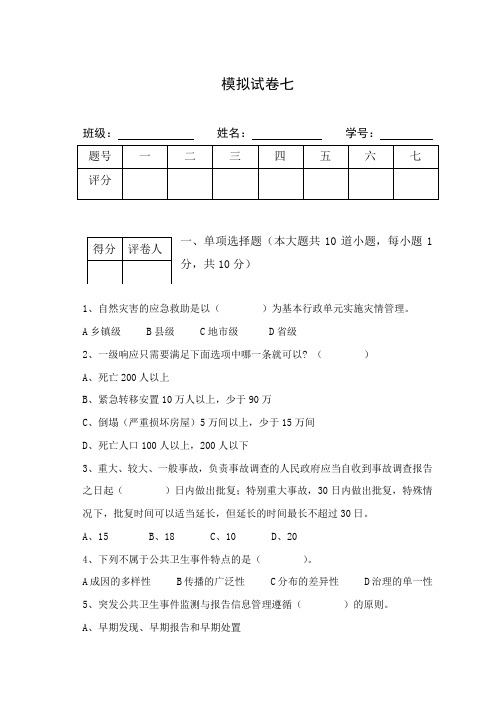
模拟试卷七班级: 姓名: 学号:一、单项选择题(本大题共10道小题,每小题1分,共10分)1、自然灾害的应急救助是以( )为基本行政单元实施灾情管理。
A 乡镇级 B 县级 C 地市级 D 省级2、一级响应只需要满足下面选项中哪一条就可以? ( )A 、死亡200人以上B 、紧急转移安置10万人以上,少于90万C 、倒塌(严重损坏房屋)5万间以上,少于15万间D 、死亡人口100人以上,200人以下3、重大、较大、一般事故,负责事故调查的人民政府应当自收到事故调查报告之日起( )日内做出批复;特别重大事故,30日内做出批复,特殊情况下,批复时间可以适当延长,但延长的时间最长不超过30日。
A 、15B 、18C 、10D 、204、下列不属于公共卫生事件特点的是( )。
A 成因的多样性B 传播的广泛性C 分布的差异性D 治理的单一性5、突发公共卫生事件监测与报告信息管理遵循( )的原则。
A 、早期发现、早期报告和早期处置B、网络直报、分层管理、逐级审阅、分级处置C、共同参与、协调配合D、动员社会力量、加强国际合作6、能否处理好突发社会安全事件的关键原则是()。
A、以人为本原则B、尽早化解原则C、依法处理原则D、当地领导负责原则7、突发社会安全事件一旦发生,首先要做的就是()。
A、领导与群众直接对话B、迅速控制事态C、主导舆论导向D、动用武装力量8、当前,国际反恐的主导是()。
A、八国集团B、欧安组织C、上海合作组织D、联合国9、制定公共危机应急救援预案的基础是()。
A、现场调查B、开展重大危险源普查C、事故等级和类型的划分D、应急响应机制10、公共危机管理法制的特点表现在内容和对象的综合性、边缘性、(),实施过程具有很强的行政紧急性,立法目的上更强调对权利的保障性以及法律制裁具有更大的严苛性。
A、程序上的法律性B、执行上的严格性C、措施上具有明显的政策性D、适用上的临时性和预备性二、多项选择题(本大题共5道小题,每小题2分,Array共10分)1、现行的突发事件应对的体制、机制和制度存在的不足有()A、应对突发事件的责任不明确B、统一协调、灵敏应对突发事件的体制没有形成C、应对突发事件能力不够强,危机意识不够高D、依法可以采取的应急处置措施不充分、不得力2、《突发事件应对法》有关预防和应急准备的制度,包括()A、规定国家建立重大突发事件风险评估体系B、建立了处置突发事件的组织体系、应急议案体系C、建立突发事件监测网络、预警机制、信息收集报告制度D、建立了社会大众学习安全知识,并参加应急演练的制度3、最小代价原则的要求包括()A、前提是保障人的生命健康优先权B、要把对自由权和财产权的损害控制到最低的限度C、坚持常态措施用尽原则D、要把对正常的生产、学习、工作和生活秩序的影响控制在最小范围4、下面说法正确的是()A、综合协调包括政府的协调和办事机构的协调B、分类管理是按照突发事件的不同特性实施相应的管理C、分级负责是指突发事件应对工作由不同层级的政府负责D、任何突发事件都必须要坚持属地管理为主5、建立信息报告机制包括()A、建立应急报告制度B、建立举报制度C、建立信息分析制度D、建立信息发布制度三、判断题(本大题共10道小题,每小题2分,Array共20分)1、()从业人员不需要接受安全生产教育和培训,掌握安全知识,提高安全生产技能,增强事故预防和应急处理能力。
- 1、下载文档前请自行甄别文档内容的完整性,平台不提供额外的编辑、内容补充、找答案等附加服务。
- 2、"仅部分预览"的文档,不可在线预览部分如存在完整性等问题,可反馈申请退款(可完整预览的文档不适用该条件!)。
- 3、如文档侵犯您的权益,请联系客服反馈,我们会尽快为您处理(人工客服工作时间:9:00-18:30)。
模拟试卷七
一、名词解释:15%(每题3分)
1、休莫机制
2、铸币平价
3、套利交易
4、欧洲债券
5、IMF
二、判断题:10%(每题1分)
1、某国国际收支平衡表中,储备资产项目为-15亿美圆,则表示该国的国际储备资产减少15亿美圆。
2、由于西方发达国家实行市场经济,因此它们对其货币汇率总是听任市场供求关系,官方不予干预。
3、一国货币对内贬值必然会导致其对外贬值。
4、在间接标价法下,外币数额越小,说明本币汇率越低。
5、固定汇率制是指现实汇率严格地受平价的制约,不可变动的汇率制度。
6、备用信贷(Stand-by Credit)是参加基金组织的会员国向基金组织申请的一种信贷形式。
7、通货区的一个重要特征是固定汇率制。
8、合资经营企业是股权式合营企业,各方的投资物都要折价计算投资比例;而合作经营企业是契约式合营企业,各方的投资物一般不折价计算投资比例。
9、在黄金非货币化以后,基金组织可以在某些情况下卖出黄金或者接受成员国的黄金支付。
10、资产组合模型的一个主要特征在于假定本币资产与外币资产是完全替代物。
三、选择题:15%(每题1分)
1、当一国经济出现膨胀和顺差时,为了内外经济的平衡,根据财政货币政策配合理论,应采取的措施是( )
A.膨胀性的财政政策和膨胀性的货币政策
B.紧缩性的财政政策和紧缩性的货币政策
C.膨胀性的财政政策和紧缩性的货币政策
D.紧缩性的财政政策和膨胀性的货币政策
2、国际收支平衡表记录的是()之间的交易。
A.一国与他国
B.任意两国政府
C.一国居民与非居民
D.一国公民与非公民
3、专利权使用费的外汇收支应记入国际收支平衡表的()。
A.投资收入项目
B.资本账户
C.金融账户
D.服务收支项目
4、国际清偿力的范畴较国际储备()。
A.为大
B.为小
C.等同
D.无法比较
5、促使中国减少储备持有额的因素有()。
A.国际收支调节因素
B.维持人民币汇率的稳定
C.通货膨胀
D.国际收支调整速度比较慢
6、标志着布雷顿森林体系崩溃的开始的事件是()。
A.互惠信贷协议
B.尼克松政府的新经济政策
C.黄金双价制
D.史密森氏协议
7. 货币市场是指资金的借贷期限为()的短期资金市场。
A.半年 B.一年以内
C.一年 D.两年以内
8、由多家银行联合提供的中长期贷款叫()。
A.单边贷款
B.双边贷款
C.辛迪加贷款
D.政府贷款
9、一般认为,一国对外债务当年还本付息总额不能超过该国当年出口收入总额的(),超过这一界限就可能造成部分债务难以清偿,因此国际上把这一比率称为“警戒线”。
A.30%
B.25%
C.50%
D.60%
10、与金币本位制度相比,金块本位和金汇兑本位对汇率的稳定程度已()
A.升高 B.降低 C.不变 D.无法判断
11、根据货币主义汇率理论,在其他条件不变的情况下,一国的货币供应量相对于其他国家增加会导致该国货币汇率()。
A.上升 B.下降 C.不变 D.无法判断
12、如果客户向银行购买外汇,应该使用银行所报出的()。
A.即期汇率 B.中间汇率
C.买入汇率
D.卖出汇率
13、在汇率理论中,具有强烈的政策性和可操作性的是:()
A.购买力平价说 B.利率平价说
C.弹性价格货币分析法
D.国际收支说
14、假设美国投资者投资英镑CDs,6个月收益5%,此期间英镑贬值9%,则投资英镑的有效收益率为()
A.14.45% B.-1.45% C.14% D.-4%
15、英镑的年利率为27%,美元的年利率为9%,假如一家美国公司投资英镑1年,为符合利率平价,英镑应相对美元:()
A.升值18% B.贬值36%
C.贬值14%
D.升值14%
四、计算题:10%(每题5分)
1、某外汇交易商想借入800,000美元或等值日元, 进行在美元和日元之间的抵补套利交易,他面对如下汇率及利率(假设美元和日元的存、贷利率相同):
即期汇率:¥124.00/$
6个月远期汇率:¥123.80/$
6个月的美元利率:年率5%
6个月的日元利率:年率3%
解释该交易员进行抵补套利的步骤,并计算获利或损失金额。
2、某国某年的部分经济指标如下表所列: 单位: 1亿美元
GNP 5,000 贸易与劳务外汇收入 100
偿还外债本息 30 对外债务总额 1,003
外汇储备 400
根据上述数据,请回答:
⑴该国当年的债务清偿率,负债率以及债务率。
⑵你认为该国的外债情况是否合理,为什么?
五、简答题:30%(每题6分)
1、简述J曲线效应是如何产生的。
2、简述中国国际储备特点。
3、简述目前有关国际货币改革的方案的具体建议有哪些。
4、简述债务危机的解决方案。
5、简述金融全球化的原因是什么?
六、论述题:20%(每题10分)
1、论述金本位制度和布雷顿森里体系下,两种固定汇率制度的异同。
2、根据案例回答问题
2006年8月,全球最大的金融期货交易所--美国芝加哥商品交易所(以下简称CME)推出人民币对美元、欧元及日元的期货和期权交易,而此前的4月,CME已和中国外汇交易中心签署合作协定,中国外汇交易中心会员单位将可以通过中国外汇交易中心交易CME全球电子交易平台上国际货币市场的外汇和利率产品。
这对中国的企业来说有什么影响呢?
我们先来看两个例子:
例一:一个中国企业于2006年7月1日出口100万美元商品,结算日为9月30日,7月1日即期汇率为1美元=8.0元人民币,收入100万美元,可换到800万元人民币。
9月30日,即期汇率跌为1美元=7.9元人民币,收入100万美元,只换到790万元人民币。
少收入人民币10万元。
例二:总经理与财务主管的对话。
某美国企业在3月1日时得知将在7月底收到10亿日元。
9月份日元期货的现价为1日元=0.8500美分。
该公司财务主管在3月1日卖空80份9月份的日元期货,并准备在7月底收到日元时,将期货合约平仓。
当7月底收到日元时,即期价格为0.8750,期货价格为0.8800。
财务主管将期货平仓,期货损失=100000×(0.8800-0.8500)=3000万日元,折算为美元=3000×0.8750/100=26.25万美元。
我们可以设想一下总经理和财务主管的谈话。
总经理:我们3个月内在期货市场上损失了26万美元,我需要你的解释。
财务主管:采用期货的目的是为了对冲暴露的日元面临的风险,而不是为了获利。
不要忘了我们的日元在现货市场上也获得了更好的价格。
总经理:那有什么关系?这好像是说我们在纽约的销售量上升了就可以不用担心加利福尼亚的销售量下降。
财务主管:如果日元贬值了……
总经理:我不关心日元贬值会出现什么情况,事实是日元升值了。
我不得不向我们的股东说明由于你的行为使利润降低了近30万美元。
这恐怕会影响你今年的奖金了。
财务主管:这不公平。
这全在于你怎么看待它……
从以上两个例子我们可以看出,汇率风险对企业经营业绩的影响还是比较明显的。
从第二个例子看,即使在经济高度发达的美国,当财务人员运用套期保值手段对冲外汇风险的时候,有时竟不能得到高层管理人员的理解。
随着中国加入世贸组织,特别是自2005年7月21日我国宣布对人民币实行有管理的浮动汇率制度以来,人民币兑美元的小幅升值就一直在持续。
实际上,在人民币汇率改革前,对于国内企业来说,汇率风险一直存在,只是由于我国一直实行接近固定汇率制度的盯住汇率制度,本币和外币间的汇率浮动区间非常小,而变动活跃的外币之间的汇率风险只涉及部分国内企业。
在这种情况下,大部分国内企业相当于生存在这种汇率制度的保护伞下,企业本应具有的防范汇率风险的能力没有得到充分发展。
目前国内的汇率制度已开始迈出了向市场化改革的步伐,但人民币汇率的波动幅度还不大,人民币汇率升值是大方向,企业可以比较容易地作出预期。
因此,总的来讲,投资者面临的汇率风险有限,国内企业对市场汇率变化的敏感程度还不够强烈,对于汇率衍生产品的需求也还不够迫切。
这种对汇率风险的轻视或者忽视正是人民币汇率改革前许多人担忧的问题之一。
因此,我们有必要一起来认真地认识一下汇率风险。
(案例来源: )
(1)案例中所涉及的汇率风险是指什么?它是如何产生的?
(2)企业在何种情况下会面临该类风险?具体影响如何?
(3)对中国企业来说,应该如何规避该类风险?。
